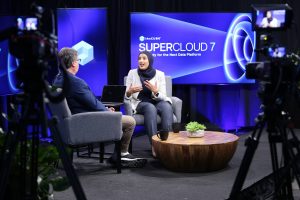 AI
AI
 AI
AI
 AI
AI
The push toward unified data platforms that can handle diverse data types and provide seamless integration for AI workloads is transforming how enterprises manage and use their data.
This shift is paving the way for more efficient, scalable and intelligent data ecosystems that can support the next wave of data analytics solutions.
“Every gen AI problem is actually a data problem to be solved, and so getting that data in shape,” said Yasmeen Ahmad (pictured), product executive – data, analytics and AI at Google Cloud. “The challenge has been, as we get into gen AI and now multimodal gen AI, images and video and other modalities, actually, you’ve got to feed those gen AI models also with multimodal data.”
Ahmad spoke with theCUBE Research’s John Furrier, executive analyst at theCUBE Research, at the Supercloud 7: Get Ready for the Next Data Platform event, during an exclusive broadcast on theCUBE, SiliconANGLE Media’s livestreaming studio. They discussed the challenges and opportunities in multicloud data integration, the criticality of AI-ready data foundations and the impact of generative AI on data analytics and enterprise data management.

Yasmeen Ahmad talks with John Furrier about challenges and opportunities in multicloud data integration.
Today, it’s common for enterprises to have data dispersed across multiple cloud platforms, such as Google, Azure and Amazon Web Services. Whether driven by acquisitions, mergers or the adoption of various software-as-a-service applications, the challenge lies in effectively connecting and using this distributed data for generative AI applications.
“Every large enterprise is multicloud,” Ahmad said. “So, this idea of really being able to connect data and leverage it for gen AI is top of mind for the execs I speak to. These gen AI models are hungry for data, for training.”
The ability to integrate diverse data sources into a cohesive platform is crucial for the development of advanced AI solutions, according to Ahmad. When organizations can connect their data no matter where it lives, it opens the door to robust data analytics. It democratizes data access, enabling widespread use of AI technologies across the enterprise. Ahmad identifies unified data platforms as integral to achieving this integration.
“For enterprises and companies, they need a single access control plane,” she said. “So, that’s what we’re really focused on at Google … how do we provide that ease of an AI-ready data foundation that comes with that single control panel, where actually that data foundation supports all open formats … because data today lives everywhere and it needs to be interoperable. It needs to be moveable.”
The evolution from traditional data warehouses to modern data platforms such as Google LLC’s BigQuery represents a significant leap in how data is processed and used. These platforms now integrate multiple engines to accommodate different data processing needs, ranging from SQL to Spark and Python, making them more versatile and capable of handling complex AI workloads.
“When we’ve benchmarked BigQuery against other data platforms in the market, we see actually four times better for performance and three times better cost of actually having gen AI models close to the data executing,” Ahmad said.
She added that customers don’t have the latency of data movement between data clouds and gen AI models or the security concerns, costs and complexities of building pipelines.
This unified data platform approach is designed to support a wide range of business intelligence and engineering workloads, enabling organizations to process data in various ways and derive meaningful insights more efficiently, according to Ahmad. This shift toward more intelligent and automated data management solutions is set to revolutionize how enterprises approach data analytics and AI development.
“Gen AI today is that assistant who’s helping you code faster,” Ahmad said. “But as we move into this agentic world, we’re seeing agents being able to actually learn tools and build pipelines on the behalf of the data engineer and actually accelerate data analytics to a degree that’s never been seen before.”
The advancements in AI infrastructure and the rise of intelligent data platforms are reshaping the landscape of data analytics and AI development, according to Ahmad. Integrating multicloud environments and unified data platforms such as BigQuery enables more efficient, scalable and intelligent data ecosystems.
“For me, gen AI is really changing the game for data and analytics,” Ahmad said. “I spoke to a customer who … had 16,000 dashboards across the organization, yet they felt insights-poor. Gen AI is going to change the game in this space with some of the new conversational analytics experiences that we are launching.
Here’s the complete video interview, part of SiliconANGLE’s and theCUBE Research’s coverage of the Supercloud 7: Get Ready for the Next Data Platform event:
Support our mission to keep content open and free by engaging with theCUBE community. Join theCUBE’s Alumni Trust Network, where technology leaders connect, share intelligence and create opportunities.
Founded by tech visionaries John Furrier and Dave Vellante, SiliconANGLE Media has built a dynamic ecosystem of industry-leading digital media brands that reach 15+ million elite tech professionals. Our new proprietary theCUBE AI Video Cloud is breaking ground in audience interaction, leveraging theCUBEai.com neural network to help technology companies make data-driven decisions and stay at the forefront of industry conversations.